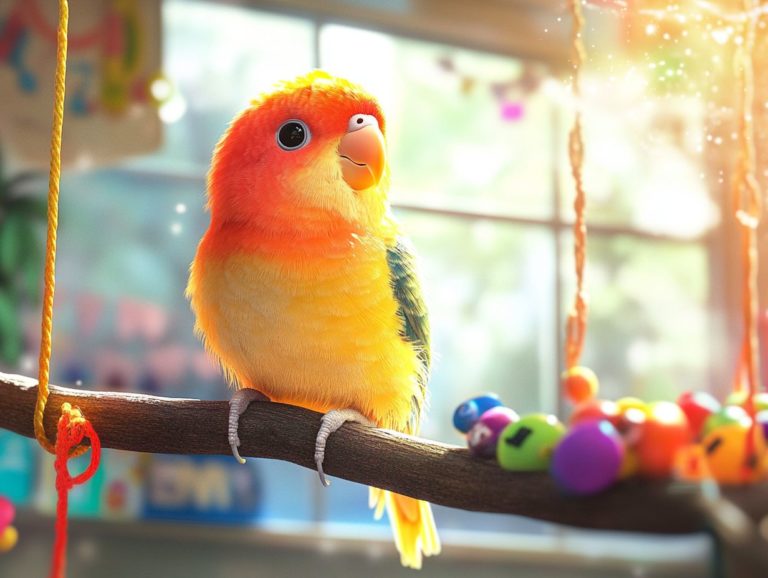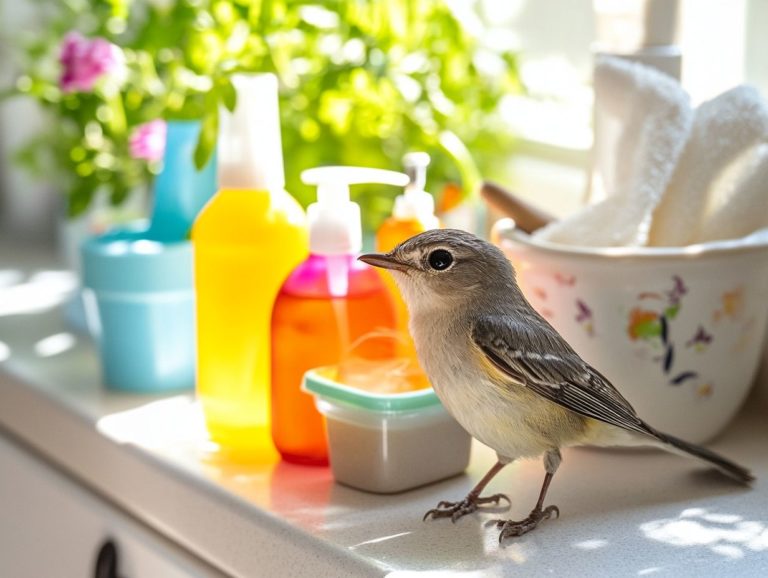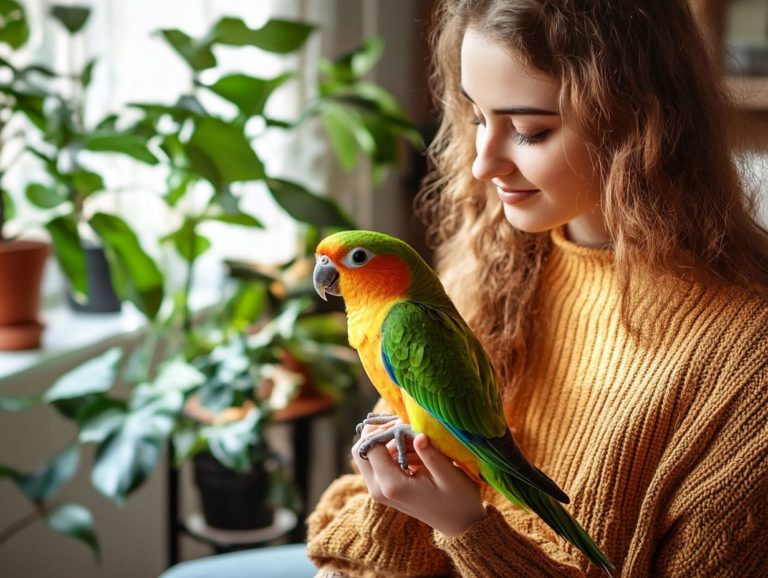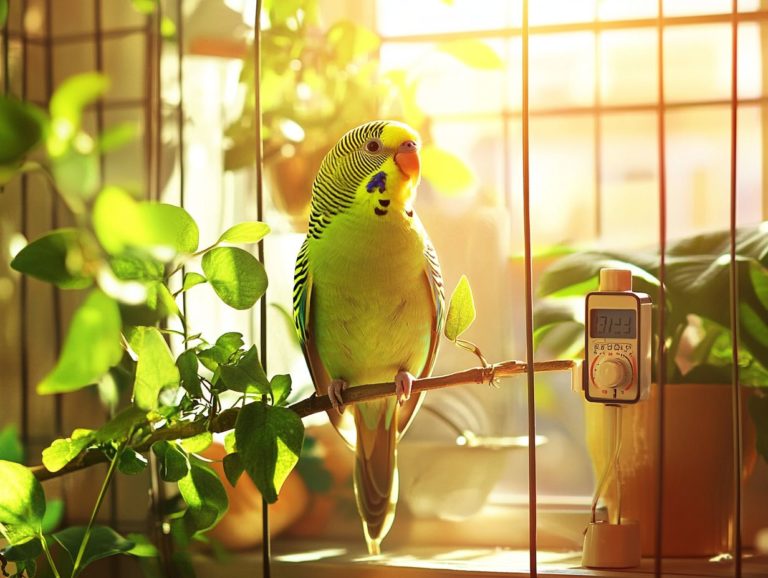What Should I Include in My Bird’s Diet?
Understanding your bird’s nutritional needs is crucial for ensuring their health and happiness, especially when considering a proper parrot diet.
Birds flourish on a balanced diet that delivers the essential nutrients required to support their vibrant lives. This article dives into the significance of a varied diet, breaking down vital nutrients like proteins, carbohydrates, and vitamins. You ll also learn about healthy options that keep your avian companion thriving.
You’ll find insights into common food options and how to craft a nutritional diet tailored specifically to your bird’s unique requirements. You ll also discover valuable tips for optimal feeding habits and guidance on when to introduce dietary supplements.
Give your feathered friend the best life possible let s ensure they receive it!
Contents
Key Takeaways:
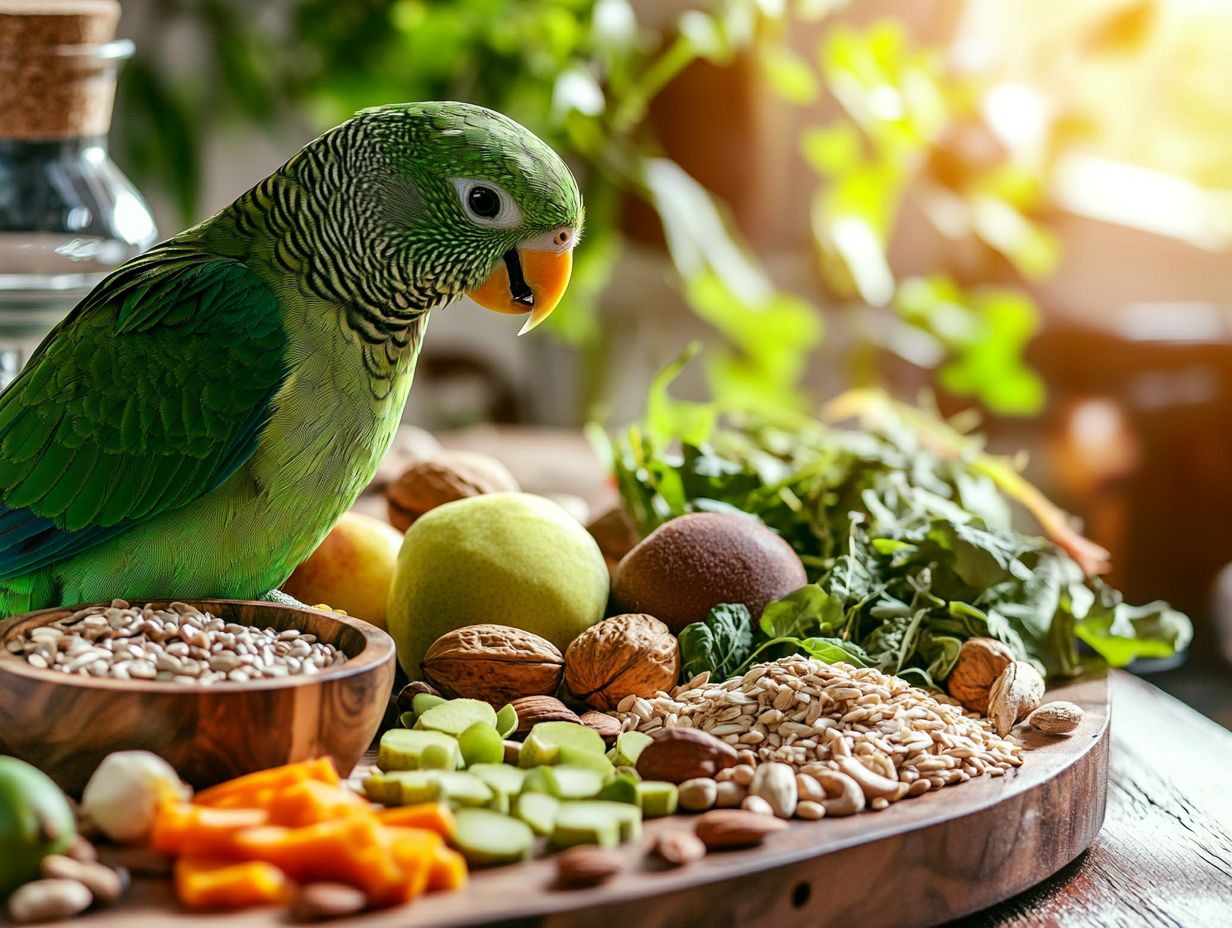
- Birds require a balanced diet to meet their nutritional needs and maintain optimal health.
- Proteins, carbohydrates, fats, vitamins, and minerals are essential nutrients that should be included in a bird’s diet.
- Fruits, vegetables, seeds, and pellets are common foods that can be incorporated into a bird’s meal plan for a healthy diet.
Understanding a Bird’s Nutritional Needs
Understanding your bird’s nutritional needs is crucial for ensuring the well-being of your feathered companions, especially if you have species like parrots, budgie parakeets, or cockatoos. A balanced diet for your parrot helps prevent common health issues while supporting overall vitality and longevity.
Consulting with bird vets can offer valuable insights into creating an optimal nutritional plan tailored to specific species, like Amazons and macaws, while considering their unique dietary needs in captivity.
The Importance of a Balanced Diet
A balanced diet is essential for your birds to maintain optimal health and ward off issues like weight gain and liver disease, which can lead to serious health complications.
To achieve this, it s crucial to incorporate a mix of fresh foods, including fruits and vegetables. These provide vital vitamins and minerals that support immune function and overall vitality. High-quality pellets should be a cornerstone of their diet, as they are specially formulated to meet the unique nutritional needs of various bird species. While seeds can be included in moderation, specialized diets ensure all necessary nutrients are covered.
Understanding how proteins, carbohydrates, fats, vitamins, and minerals work together can significantly enhance the well-being of your avian companions. It s imperative for you, as a bird owner, to prioritize these dietary components to foster their health and happiness.
Essential Nutrients for Birds
Essential nutrients proteins, carbohydrates, fats, vitamins, and minerals are crucial for supporting the health and vitality of birds, especially in species like cockatiels and greys.
Proteins, Carbohydrates, Fats, Vitamins, and Minerals
Proteins, carbohydrates, fats, vitamins, and minerals are essential components of your bird s diet, each playing a unique role in contributing to their overall well-being.
For instance, proteins are vital for growth and repair and are found in legumes and seeds that supply the necessary amino acids. Carbohydrates serve as a quick energy source, commonly found in fruits and grains, fueling your bird s daily activities and maintaining their stamina.
Don t overlook fats; they are crucial for keeping feathers healthy and insulating the body, particularly for species like budgie parakeets and cockatoos. Nuts and avocados are excellent options to include in their diet. Vitamins like A, D, and E are key players in vision, bone health, and reproductive functions, with leafy greens and fortified foods being rich in these nutrients.
Minerals such as calcium and phosphorus support strong bones and proper metabolic functions, with sources ranging from grit to crushed eggshells enhancing their nutritional intake. A balanced diet that incorporates these elements is essential for ensuring optimal health and longevity for your avian companions.
Start enriching your bird s diet today for a happier, healthier companion!
Essential Foods for a Healthy Bird Diet
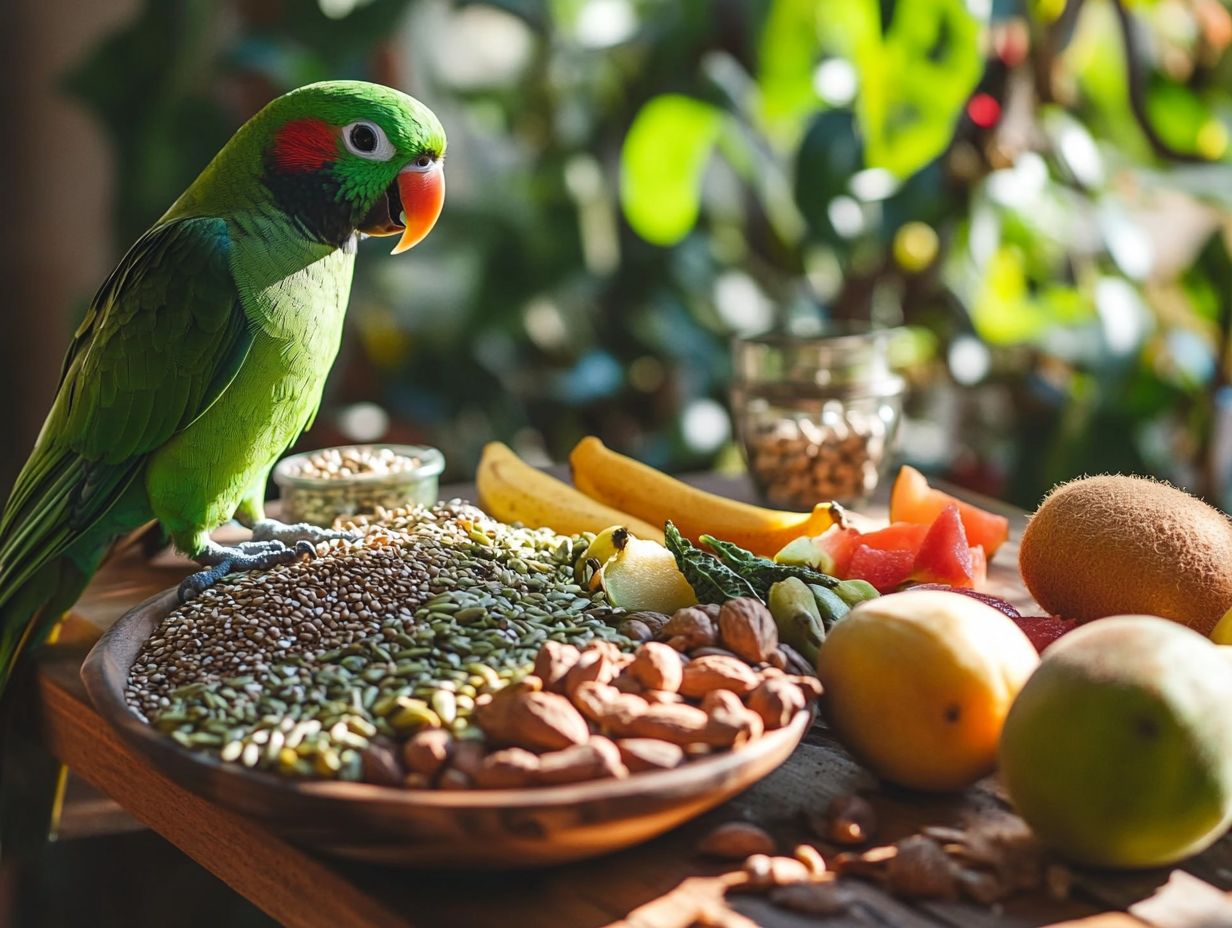
Common foods that you can offer birds include a delightful array of fruits, vegetables, seeds, and pellets. Together, these options supply the essential nutrients vital for their well-being.
Fruits, Vegetables, Seeds, and Pellets
Fruits, vegetables, seeds, and pellets are essential elements of a bird’s diet, each offering distinct health benefits and vital nutrients.
Incorporating a variety of fruits like apples, bananas, and berries can significantly enhance your bird’s overall well-being, as these options are packed with vitamins and antioxidants.
Vegetables such as carrots, spinach, and bell peppers not only bring a splash of color to the menu but also provide crucial nutrients like beta-carotene a nutrient important for vision and immune function and fiber, which is important for digestion.
For seeds, opting for high-quality brands like Harrison’s and Lafeber ensures your bird receives a balanced diet, while pellets deliver reliable nutrition. By mixing fresh produce with seeds and pellets, you can craft a wholesome menu that caters to all dietary needs, fostering a vibrant and healthy parrot.
Creating a Healthy Diet Plan for Your Bird
Crafting a healthy diet plan for your bird requires a good understanding of their specific needs and preferences. It s essential to provide a carefully curated mix of fresh, nutritious options tailored specifically for species such as macaws and cockatoos.
This personalized approach not only supports their well-being but also enhances their overall happiness.
Factors to Consider and Sample Meal Plans
When crafting meal plans for birds, it’s essential to consider factors such as age, species, and health status to ensure they receive optimal nutrition.
Activity level is particularly crucial in determining the right balance of nutrients; more active birds require a higher energy intake than their less active counterparts. Specific health concerns, such as obesity or feather plucking, will also guide dietary needs.
For active birds, include fresh vegetables like bell peppers and high-quality pellets. A plan for less active birds should emphasize leafy greens and lower-fat sources, ensuring they still obtain essential vitamins while managing their weight effectively.
Supplements for Birds
Dietary supplementation may be essential for certain birds to tackle specific health issues stemming from deficiencies in their formulated diets.
When and How to Use Supplements
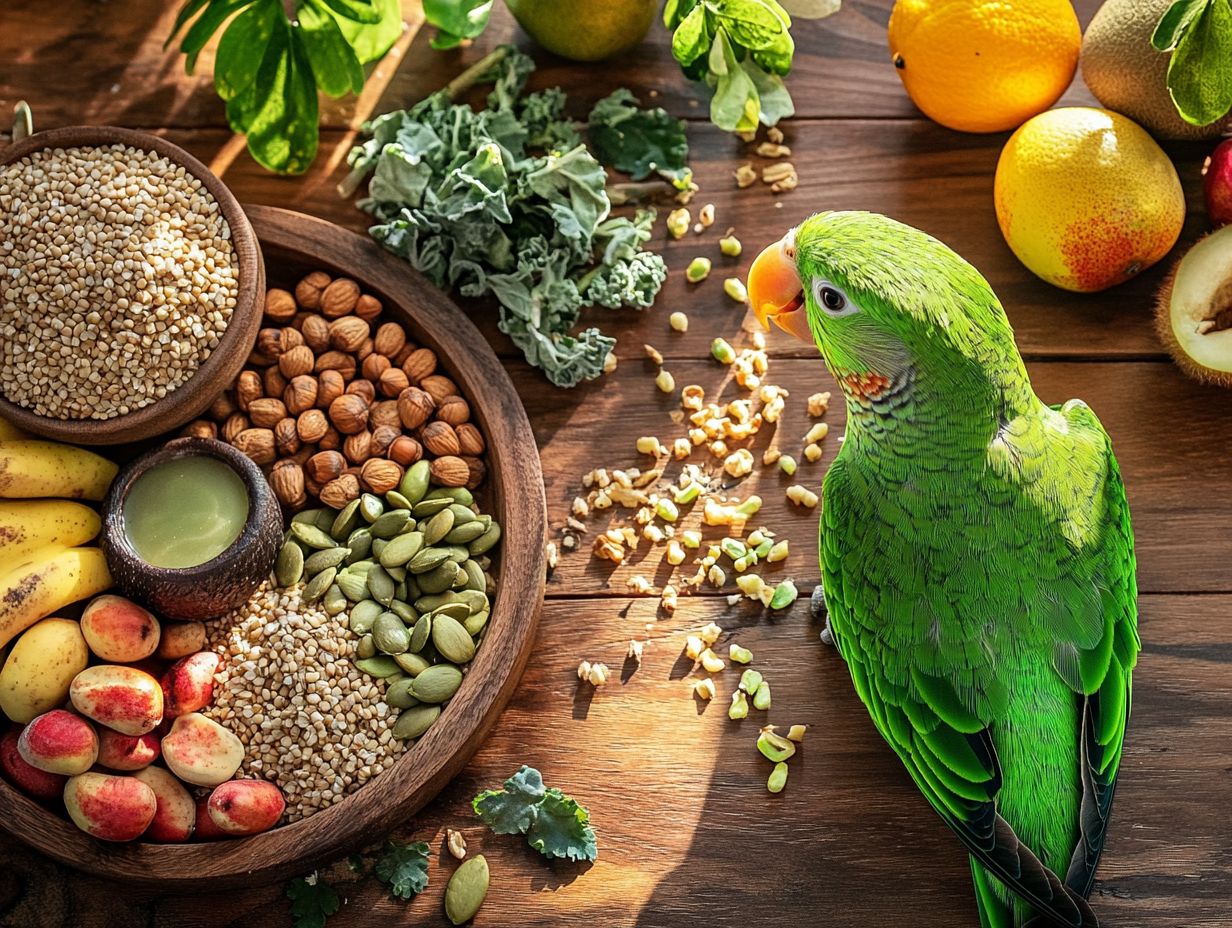
Knowing when and how to use supplements can greatly enhance your bird’s health, particularly when addressing specific health issues or dietary deficiencies.
Remember, supplements are not a one-size-fits-all fix; they should be tailored for your bird’s unique needs! Talk to your avian veterinarian to assess your bird’s diet before using any supplements.
For example, vitamin and mineral powder can effectively tackle deficiencies, while fatty acids might help promote vibrant plumage. Specific supplements, such as probiotics, can support digestion and bolster overall immunity.
Don’t wait! Address dietary deficiencies promptly to keep your feathered friend healthy. Regular consultations with a veterinarian can provide you with personalized recommendations, ensuring that any supplements you use effectively contribute to a balanced nutritional regimen for your bird.
Feeding Tips for Optimal Health
By implementing effective feeding tips, you can significantly enhance your bird’s overall health and well-being, fostering a varied and nutritious diet that supports their vitality.
Start today to provide your bird with the healthiest diet possible!
Best Practices for Feeding Your Bird
Adopting best practices for feeding your bird ensures they receive essential nutrients while minimizing the risk of exposure to toxic foods.
To create a balanced diet, think about incorporating a variety of fresh fruits, vegetables, and high-quality pellets made specifically for your bird’s type. Proper storage is crucial keep perishables in the refrigerator to maintain their freshness and prevent spoilage.
When preparing meals, always wash the produce thoroughly to eliminate pesticides and chemicals. Cut them into manageable sizes for easy consumption. If you’re considering a switch between different diets, like moving from seed-based to small round foods made for birds, take your time and do it gradually. This gentle transition will help your avian companion adjust smoothly, avoiding any digestive issues and ensuring they continue to thrive in optimal health.
Video: Tips for Feeding Your Bird
Frequently Asked Questions
What Should I Include in My Bird s Diet?
A balanced diet for your bird should include a variety of fresh fruits, vegetables, high-quality pellets like Nutri-Berries or Avi-Cakes, seed mixes, and occasional treats.
What types of fruits and vegetables should I include in my bird’s diet?
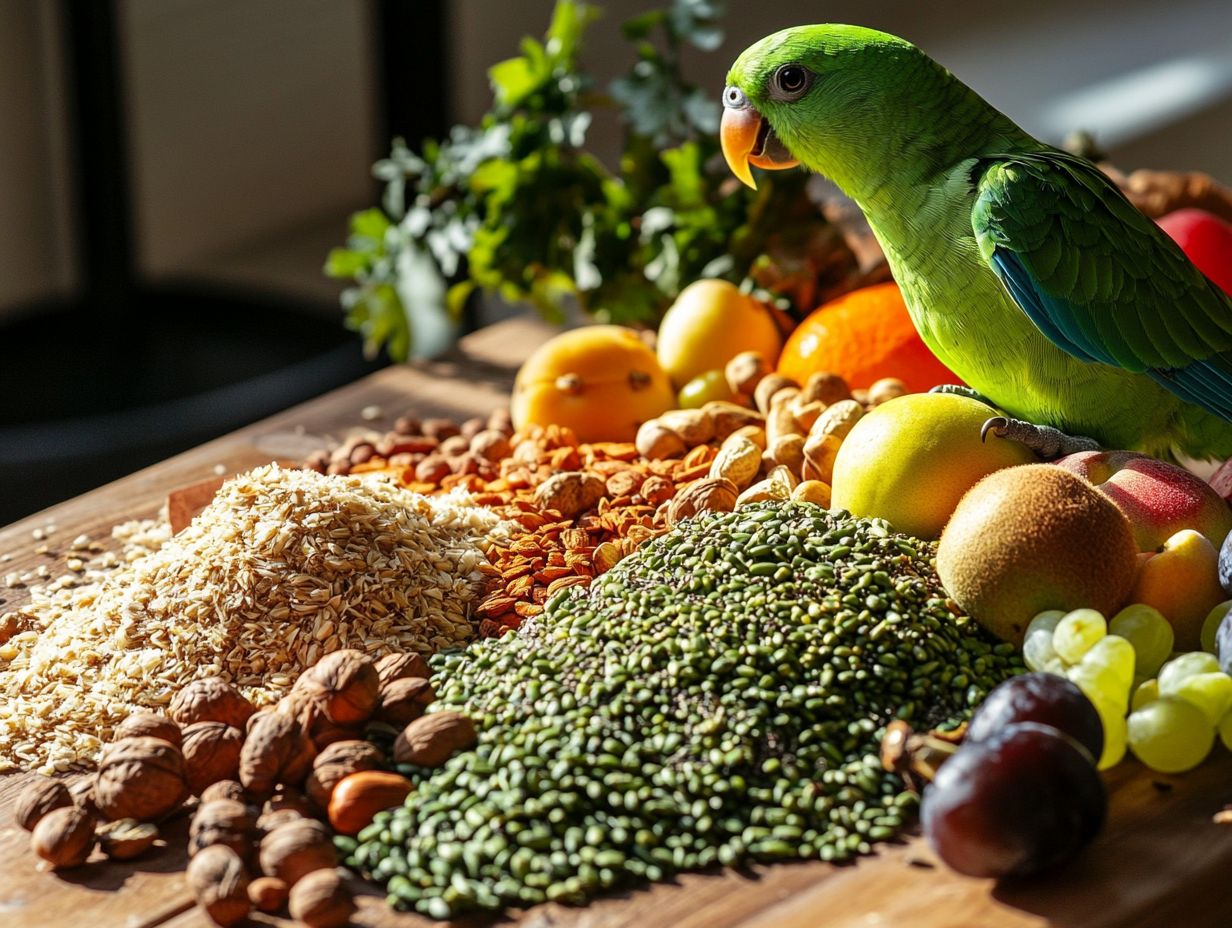
Some recommended options for birds include apples, bananas, berries, broccoli, carrots, and leafy greens. It s important to offer a variety of colors and textures to ensure a well-rounded nutritional diet.
Can I feed my bird table scraps?
While it may be tempting to share your meal with your bird, avoid giving them toxic foods and table scraps, as these may not provide the necessary healthy nutrients and could harm your bird’s health.
Do birds need any supplements in their diet?
A healthy diet typically provides all the nutrients your bird needs. However, certain dietary supplements may be recommended by your avian veterinarian if your bird has specific dietary requirements or deficiencies.
What are some healthy treats I can give my bird?
Some appropriate treats for birds include small pieces of fruit, whole-grain crackers, healthy snacks, and unsalted nuts. Keep in mind that treats are a fun addition but should only make up a small portion of your bird’s diet and should not be given too frequently.
How often should I change my bird’s diet?
It s recommended to provide a variety of foods in your bird’s diet, but sudden changes can upset their digestive system. Any changes, including the introduction of seed mixes or home-cooked meals, should be made gradually over a period of at least a week. If your bird shows signs of discomfort or illness, consult your avian veterinarian.
Don t wait ensure your bird’s diet is safe and healthy today! If in doubt, consult your vet for personalized dietary advice.

